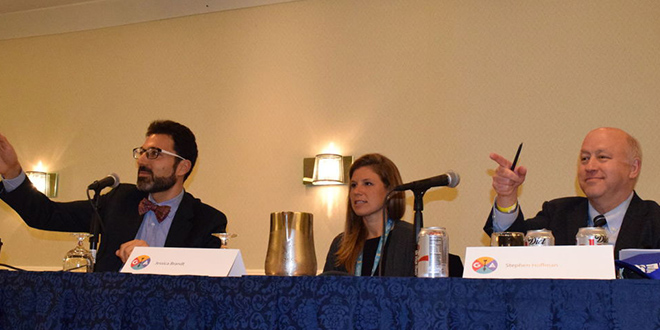11/15/2016
From JFNA GA: World Jewry 10 Years Out
- Share This Story
World Jewry 10 years out – what will it look like?
Article reprinted with permission from Cleveland Jewish News.

Matthew Rojansky, from left, Director of the Kennan Institute of the Woodrow Wilson Center, and Jessica Brandt, Associate Fellow and Special Assistant to the President, at Brookings Institution, discuss what world Jewry could look like in 10 years with moderator Stephen H. Hoffman, President of the Jewish Federation of Cleveland.
By Bob Jacob
WASHINGTON – Are we seeing a repeat of the 1920s and 1930s that led to the Holocaust or is the reaction to world events overblown?
Stephen H. Hoffman, president of the Jewish Federation of Cleveland, moderated a panel, “Ten Years Out: The Future of World Jewry,” to a packed room Nov. 14 at the 2016 Jewish Federations of North American General Assembly at The Washington Hilton.
Panelists were Jessica Brandt, associate fellow and special assistant to the president at Brookings Institution, and Matthew Rojansky, director of the Kennan Institute of the Woodrow Wilson Center. Dr. Linda Ketover, president of the Minneapolis Jewish Federation, introduced the session.
Hoffman set the scene for the discussion, which helped to kick off day 2 of the JFNA GA. He recalled what a rabbi taught him 44 years ago when he was in graduate school, which is relevant today.
“His theme was in Jewish history, in the history of the world, Jews thrive only on the very narrow place on the spectrum of the conflict between the left and the right. He would call it the Litmus test and we were OK as Jews only when the pH value was neutral. When the left was dominant and that was in the ’70s, represented by the Soviet Union and Communism, we lose. We lose big time. And when the right was dominant as in Nazi Germany and Fascist Italy and other parts of Europe, we lose big time. … In that neutral pH zone, I think it’s seven on the Litmus test, are we able as a Jewish community, thrive. … Where are we now on that Litmus test?
“The world order was upset as we came out of World War I, we had the rise of populism, we had the rise of nationalism, we had the struggle between the left and the right and it got pretty ugly as we all know. And for us, it ended up in the Holocaust,” Hoffman said. “We came out of World War II, there was a new world order established on a different nature led by the United States that in the previous decades had been America first and some people wondered whether we’re partly responsible for the way the world went off the tracks and led to World War II. And now we seem to be in a similar position, where populism is on the rise, nationalism in Europe is on the rise when you talk about Brexit. …For the last 12 to 15 months, we heard the term ‘America first again.’
“While maybe it has a different meaning for some of the people using the term today, for others it may just be a revival of the memory of what America first meant prior to World War II in a period where there’s world turbulence and again, what is America’s role? You add into that mix the Arab spring, unrest in the Middle East. There’s a new player in this mix that wasn’t necessarily there in China. … Russia is a different kind of player and we have the new arrival of social media, which makes everything more immediate and more intense. So where do we go? What does it mean?”
Rojansky said he doesn’t believe that it’s a repeat of the early century issues, but it’s “just more complicated.”
“This underscores the need to look at each of the individual cases and not simply generalize, ‘Oh my G-d, the sky is falling and history is going to repeat itself,’ because it probably isn’t exactly in the way we might think,” he said. “That said, what is real and what is scary about what is going on now, is that we see a number of things. We see conflicts, we see systemic vulnerabilities and all of that, of course, adds up to risks.”
He described conflicts as: shooting wars such as in Syria and Ukraine with thousands of casualties and the engagement of world powers that may be “battle testing” weapon systems; frozen or suspended or potential conflicts mostly found in the Soviet periphery such as in Muldova which had an election this week and Central Asia, which still has lots of Jews living in the central cities; and the new cold war dynamic between the major powers of Russian and the United States.”
All of that can have an impact on world Jewry.
“What is risky to us is the rise of right-wing politics in Europe, which historically has not been friendly to Jews,” Brandt said. It could become a “scarier Europe for Jews.”
Hoffman described a recent visit to St. Petersburg that told a chilling tale.
“We entered a new room of The Jewish Agency office and started to get into a discussion about what was going on in Russia,” he recalled, “And people kept pointing to the ceiling. I told them it’s new construction, what are you worrying about.”
The concern was that they were being watched.
While some Jews are happy living where they are, others may want to move but can’t for lack of funs or a fear of the unknown.
So Hoffman asked whether an economic relocation fund should be established for Jews in Europe to assist them in relocating from one part of Europe to another.
“We don’t have that today,” he said. “We don’t think like that and I’m not sure our Jewish compatriots in Europe and France think like that.”


Comments